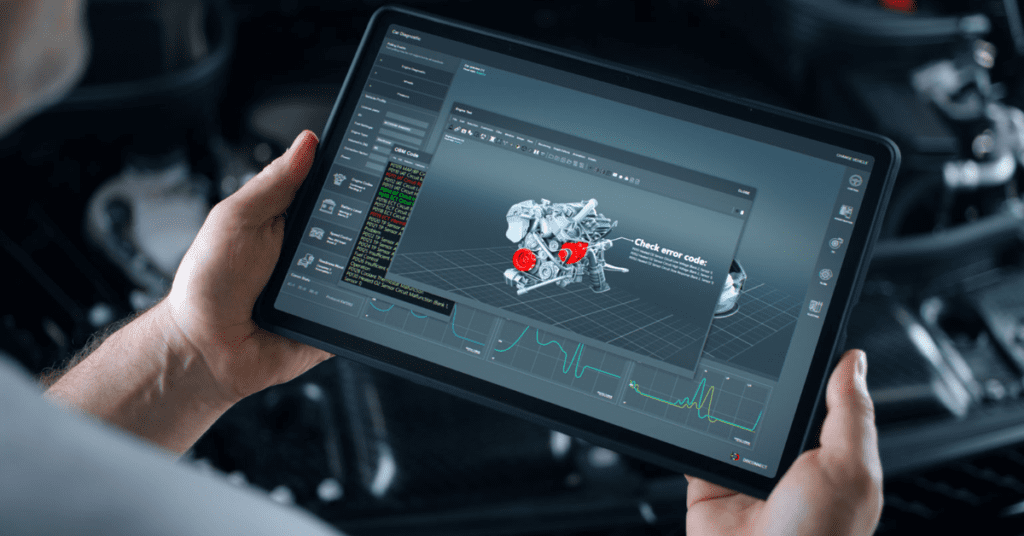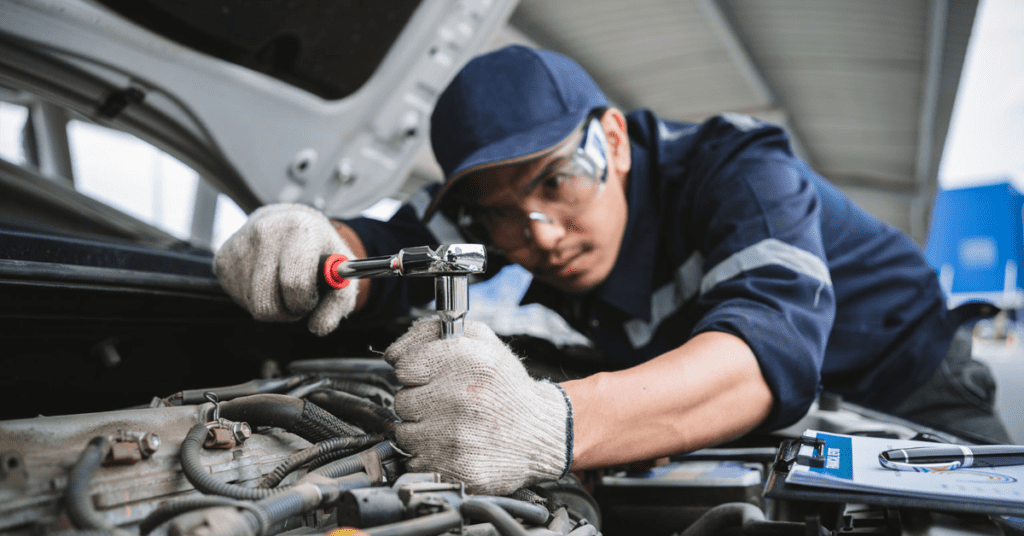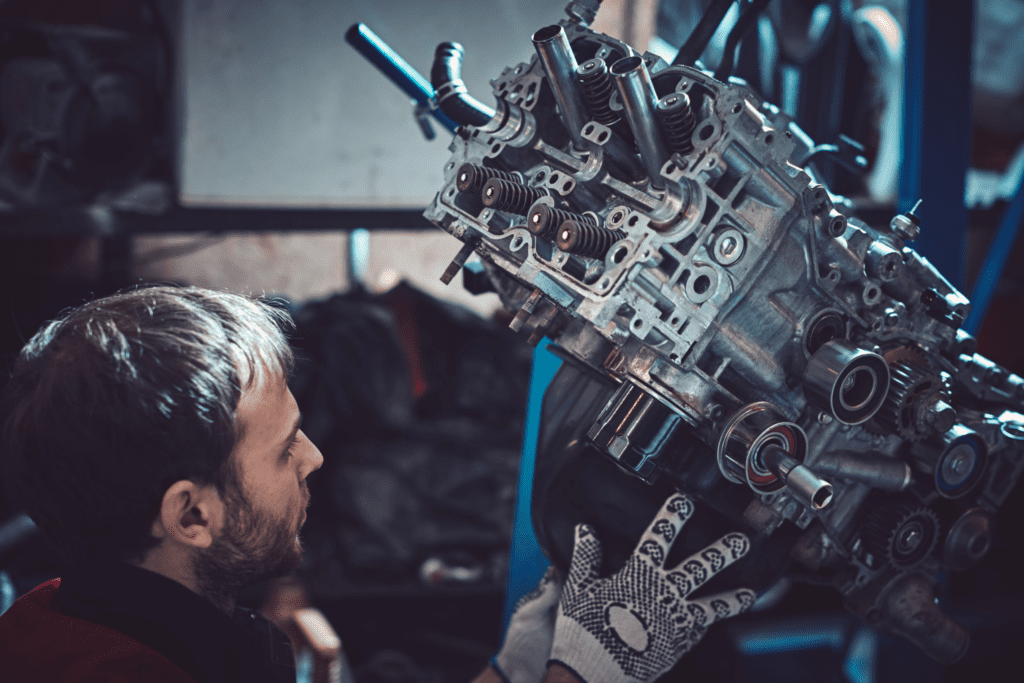Big Guide to Engine Repair in Albuquerque
Your vehicle’s engine is the head honcho under the hood. It’s responsible for generating power. Without it, your automobile isn’t going anywhere.
From the cylinder block and crankshaft to the ignition system and pistons, each component of the engine plays a crucial role in the smooth operation of your vehicle.
Don’t be an irresponsible vehicle owner. Have a trusted mechanic perform routine maintenance and address any issues right away to keep your car, truck, minivan, or SUV humming along happily.
In this comprehensive guide to engine repair in Albuquerque, we discuss:
- How do you identify common engine problems?
- How often should you get your engine serviced?
- What is involved in an engine diagnostic?
- How much does engine repair in Albuquerque cost?
- How do you choose a reputable engine repair shop in Albuquerque?
- How can you prevent engine problems?
- What are some common engine repair services?

How do you identify common engine problems?
Most people don’t give much thought to their vehicle’s engine when they start it up. You turn the key and just expect things to work as intended. However, sometimes your engine sends subtle warning signs that it’s struggling to perform. Ignore them, and you could find yourself with an expensive problem.
Identifying common engine problems in vehicles isn’t hard if you know what to look – and listen – for every time you start your vehicle. Some of the steps you can take to prevent a breakdown or other serious engine issue include:
- Check for fluid leaks. Inspect the ground under your automobile regularly for any fluid leaks. The engine oil is black. Coolant is usually bright green, and transmission fluid has a dark reddish hue. Leaks point to problems with gaskets, hoses, and seals.
- Listen for unusual noises. Pay attention to any abnormal sounds from the engine, including hissing, knocking, rattling, and squealing. If you hear them, it can signal issues with the engine’s internal components, belts, or hoses.
- Monitor dashboard warning lights. Since 1996, all new vehicles sold in the U.S. are required to include an onboard vehicle diagnostics system called OBD2. If the check engine light, oil pressure, or temperature warning lights come on, don’t ignore them.
- Note engine performance issues. Pay attention to any changes in how your engine performs. If your vehicle seems sluggish, lags when you feed it gas, stalls out, or otherwise rides rough, it’s time to get it to the shop for an inspection.
Automotive shops that perform engine repair in Albuquerque can conduct a diagnostic scan to uncover specific information about the nature and location of any problems.
How often should you get your engine serviced?
Every vehicle comes with an owner’s manual that details a recommended service schedule for the make and model. How often you should have your engine serviced depends on several factors, including the type of engine and the driving conditions.
Most newer vehicles need an oil change every 7,500 to 10,000 miles. Some vehicles come with oil life monitors that signal when it’s time for an oil change.
If you drive an older vehicle or use conventional instead of synthetic oil, you may need an oil change more frequently.
Your driving habits also play a role. The extreme temperatures in Albuquerque during certain seasons can put added stress on your engine. Other driving habits that might require more frequent engine servicing include frequent short trips, driving in stop-and-go traffic, and towing heavy loads.

What is involved in an engine diagnostic?
An engine diagnostic identifies and troubleshoots issues with your engine or its related systems. Mechanics in Albuquerque use specialized tools and techniques to gather data, analyze it, and pinpoint the root of the problem.
The engine diagnostic process includes several phases:
- Initial assessment. During this stage, your mechanic asks questions about symptoms you’ve noticed and any specific concerns. They may perform a visual inspection of the engine bay, checking for any obvious signs of damage, leaks, or loose connections.
- Diagnostic scan. Your mechanic connects a diagnostic scan tool to your vehicle’s OBD-II port to retrieve diagnostic trouble codes stored in the computer system. These codes serve as a starting point for pinpointing any engine problems.
- Component testing. Based on the initial assessment, trouble codes, and any live data the mechanic pulls from your vehicle’s engine, the next step involves performing targeted tests on specific engine components or systems.
Your mechanic uses their expertise and experience to interpret data and information from visual inspections and physical checks of various components to identify the problem and recommend corrective actions or other repairs.
How much does engine repair in Albuquerque cost?
How much engine repair in Albuquerque costs depends on several factors. The type of repairs needed, the extent of the damage, and the make and model of your vehicle apply. Every engine repair shop has hourly labor rates or fixed prices for diagnostics. Your mechanic can provide an estimate of cost before you agree to have any diagnostic or repair work done.
Major engine repairs or complete rebuilds and replacements can cost a few thousand dollars depending on the complexity of the engine and the parts required. Smaller repairs, such as fixing a specific component or addressing a minor issue, cost significantly less.
To get the most for your money, provide as much information as possible about your vehicle and the symptoms you’re experiencing to an engine repair technician. This helps them provide a more accurate estimate for their services.
Make sure you also mention if your vehicle has any warranties before scheduling work to ensure the engine repair shop you’ve chosen is approved by the warranty provider.

How do you choose a reputable engine repair shop in Albuquerque?
Choosing a reputable engine repair shop ensures your vehicle gets the quality service needed at a fair price. Reliable and trustworthy businesses aren’t hard to find when you make your selection based on several key factors.
- Recommendations and Reviews
Seek recommendations from your family, friends, and colleagues who have had positive experiences with engine repair shops. Online review platforms also provide valuable insights into the reputation and quality of service provided. - Certifications and Affiliations
Look for engine repair shops that have certifications from recognized industry organizations such as the National Institute for Automotive Service Excellence (ASE). These certifications indicate that technicians have met competency standards. Additionally, check if the shop is affiliated with reputable automotive associations or has manufacturer certifications for specific vehicle makes and models. - Experience and Expertise
Consider the shop’s experience in engine repair. A well-established shop with a proven track record is more likely to have the necessary expertise and knowledge to handle a variety of engine issues. - Warranty and Guarantees
If the shop you choose provides guarantees on their work, ask to see the specifics. Be sure to understand all terms and conditions – including the fine print – before deciding. - Excellent Customer Service
Friendly, knowledgeable staff who are willing to answer your questions and explain the repair process provide peace of mind. - Diagnostic Capabilities
Engine diagnostics play a crucial role in identifying and resolving issues accurately. Ensure the repair shop has access to modern diagnostic tools and equipment, as well as skilled technicians who are well-trained to use them.
Above all else, trust your instincts. If a repair shop doesn’t feel like the right fit, find another one. Engine repairs are costly. You want reassurance they’ll be done correctly the first time.
How can you prevent engine problems?
Preventing engine problems requires regular maintenance and adopting good driving habits. By following these guidelines, you can reduce the risk of engine issues and extend the life of your vehicle.
Get Regular Maintenance
Following the manufacturer’s recommended maintenance schedule outlined in the owner’s manual is one of the smartest things you can do to protect against engine damage. The manual spells out specifics on:
- How often to get oil changes.
- What filters and oil to use.
- How to conduct fluid checks.
Proper maintenance keeps your engine humming smoothly and allows for early detection of potential problems before they turn into costly repairs.
Use High-Quality Fluids and Filters
Always use the recommended grade and type of engine oil, coolant, and other fluids outlined in your owner’s manual. High-quality fluids and filters provide better protection and performance for your engine.
You may think you’re getting a deal by using cheaper alternatives. However, skimping on quality can end up costing you thousands later in costly repairs.
Monitor Fluid Levels
Regularly check and maintain proper fluid levels in your vehicle. Engine oil, coolant, transmission fluid, and power steering fluid all work together to keep your engine in working order. Low or dirty fluids can lead to engine problems.
Change Oil and Filter Frequently
Living in Albuquerque comes with specific engine challenges, especially during the hotter summer months. That’s why it’s important to change your engine oil and filter per the manufacturer’s suggested guidelines.
Engine oil lubricates and protects your engine’s internal components. Regularly replacing the oil and filter prevents contaminants from circulating in the engine, which can cause significant damage.
Address Warning Signs ASAP
Never ignore warning signs in the hope they’ll go away. If you notice any unusual noises, warning lights, or changes in engine performance, get to an engine repair service you trust for an inspection with a qualified mechanic.
Engine knocking, hissing, and hesitation when accelerating are all signs that something isn’t working correctly. Promptly addressing these warning signs prevents further damage and costlier repairs.

What are some common engine repair services?
Engine repair services depend on the type of issues your engine is experiencing. When you schedule engine repair in Albuquerque, your technician can explain what the warning signs indicate and what type of service is needed to correct them.
Some of the most common engine repair services include:
- Cooling system repairs. Your radiator’s main job is to keep your engine cool. If it malfunctions, you may need to repair or replace it to prevent damage to your engine. Other cooling system repairs can involve thermostat replacement, water pump replacement, coolant flush and fill, or a heater core repair or replacement.
- Cylinder head repairs. The cylinder is a vital part of the internal combustion engine. It sits on top of the engine block and forms the top of the combustion chamber. It controls intake and exhaust among other functions. Repairs can include cylinder head gasket repairs or replacement, cylinder head crack repair, and valve guide replacement.
- Engine rebuilds and replacements. If your problem is extensive, you may require an engine rebuild or total replacement. Engine rebuilds involve disassembling and reconditioning the engine’s internal components.
- Engine tune-ups and diagnostics. Your engine has many moving parts that keep it operating as intended. You may need spark plugs, ignition coils, PCV valve replacements, throttle bottle cleaning, or idle speed adjustments.
- Fuel system repairs. If your fuel system goes bad, it can’t feed the engine. Some repairs you may need include fuel pump replacement, fuel injector cleaning or replacement, fuel pressure regulator replacement, and fuel system leak diagnosis and repair.
Engine Repair in Albuquerque You Can Trust
Finding reputable engine repair in Albuquerque is easy when you rely on the experienced engine repair technicians at Rio Grande Automotive. We specialize in engine repair services for domestic and foreign vehicles. Give us a call to schedule a diagnostic evaluation if you suspect your engine needs our expertise.